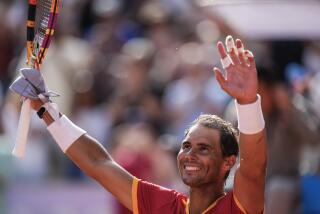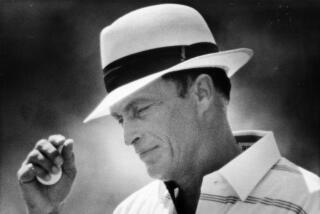Drug Penalty a Test for Chela
- Share via
It isn’t necessary to have a pharmacological degree to stay on the cutting edge of sports coverage. Not yet, at least.
The Internet helps. Acquaintances who have a working knowledge of multisyllabic words containing testosterone or ending in lone are even more beneficial.
Juan Ignacio Chela, 21, of Argentina knows too well. His career hit a serious obstacle last week when he received a three-month suspension after testing positive for the banned anabolic steroid methyltestosterone. He will lose some money--$8,550--and his ranking points from the last eight months, and worse yet, a clean reputation.
Chela said he did not knowingly take a steroid, asserting that his doctor gave him a pill and he thought it was a vitamin or amino acid. The three-person anti-doping tribunal believed him and handed Chela a lesser sentence.
This is the first drug case on the men’s tour since the Petr Korda controversy at the Australian Open in 1999. Korda, the 1998 Australian Open champion, tested positive for nandrolone at Wimbledon in 1998 and was ultimately banned for a year.
Before that resolution, the tour was in an uproar because an appeals panel had waived the mandatory one-year suspension because of “exceptional circumstances.” Korda was allowed to play the 1999 Australian Open under heavy scrutiny. He was booed and one player refused to shake his hand. Others criticized the decision.
So, what is the difference between the Korda and Chela cases?
As an outgrowth of the Korda matter, the “exceptional circumstance” clause was tightened and clarified. Korda had said he did not know how the drug got into his system and never offered an explanation.
Chela’s defense did include clear details--the physician gave him the pill and he did not know it was a steroid. Of course, “the doctor-gave-it-
to-me” defense did not work for Olympic gymnast Andreea Raducan of Romania, who lost her all-around gold medal at Sydney when she tested positive for pseudoephedrine after the team doctor gave her a cold medicine.
But Chela’s penalty is tougher than it appears. By losing the ranking points he had acquired the past eight months, he will fall out of the top 500 when the suspension lifts in July. That means he will have to return to the Challenger level because his ranking will not qualify for direct entry into Grand Slams or any other international series events.
Chela, one of several talented young Argentines, clearly has some game. He pushed Pete Sampras to five sets in the third round of the Australian Open in January and reached the final at Bogota in February.
One question remains: Shouldn’t the physician face some sort of penalty? The Argentine newspaper, Clarin, reported last week that the doctor could be facing a sanction by Argentina’s Olympic Committee.
LOST LADS
If Greg Rusedski does something newsworthy, wait a few days and Tim Henman will follow suit. The same holds true, too, if Henman makes a move first.
The evidence?
Rusedski married a woman named Lucy on Dec. 4, 1999. Henman married a woman named Lucy on Dec. 11, 1999.
Now, the two Brits have split from supportive figures (no, not their wives) within a few days of each other. Early last week came the news that Henman was breaking with his longtime coach and friend David Felgate, who had worked with him throughout his professional career.
Henman, it seems, had stagnated and received no shortage of advice from the British press and former star players such as John McEnroe. For now, he is coach-less.
Then Sunday in England, news surfaced that Rusedski would no longer work with former Wimbledon champion Pat Cash. Their brief partnership had been enormously successful. Rusedski beat Gustavo Kuerten at the Australian Open and followed with victories over Andre Agassi in the San Jose final and other victories against Marat Safin and Lleyton Hewitt.
Cash had been widely credited with rescuing Rusedski from career oblivion.
Evidently, it came down to pounds. Cash was quoted in two British newspapers as saying the falling out was over money. He had been working for free and was dismissed after broaching the subject of pay, Cash said.
Imagine the headlines to come:
“Grinning Greg Greedy Greg.”
“Pat No Cash.”
“Not Even a Half-Pence For His Thoughts.”
MARTINA, THE FIRST
Long after Martina Hingis, the namesake, had departed Amelia Island, Fla., having lost in the quarterfinals, the original Martina, Navratilova, was around. At 40, Navratilova reached the doubles final with Arantxa Sanchez-Vicario of Spain before losing the title match in straight sets.
Earlier, Navratilova did not shy away from the recent controversy involving the Williams family, saying she did not think there was racism on the tour. Those comments drew a great deal of attention last week, but Navratilova also was highly complimentary of Venus and Serena Williams.
“The girls are great,” she said. “They’re great athletes, nice women. I like them a lot and their father [Richard] seems to be getting in the way.”
In particular, she criticized Richard Williams’ celebratory behavior on the court after Venus beat Lindsay Davenport in the final of the U.S. Open last year.
“If Richard Williams had danced in front of me after I lost to one of his daughters in a match, I probably would have hit him,” Navratilova said, smiling. “What he did at the U.S. Open was absolutely horrible. It has no place in sports or in tennis.”
He is hardly the first tennis father to step over the line, though.
“It’s difficult for the daughters to control their fathers,” she said. “We’ve had some amazing fathers in tennis before and it’s always been difficult for [players] to tell their fathers to cool it.”
AND, FINALLY
Words uttered by a Spaniard, of course:
“If there are seven tournaments on clay, I’m going to play eight,” said Juan Carlos Ferrero, winner of the Estoril tournament on Sunday.
More to Read
Go beyond the scoreboard
Get the latest on L.A.'s teams in the daily Sports Report newsletter.
You may occasionally receive promotional content from the Los Angeles Times.







